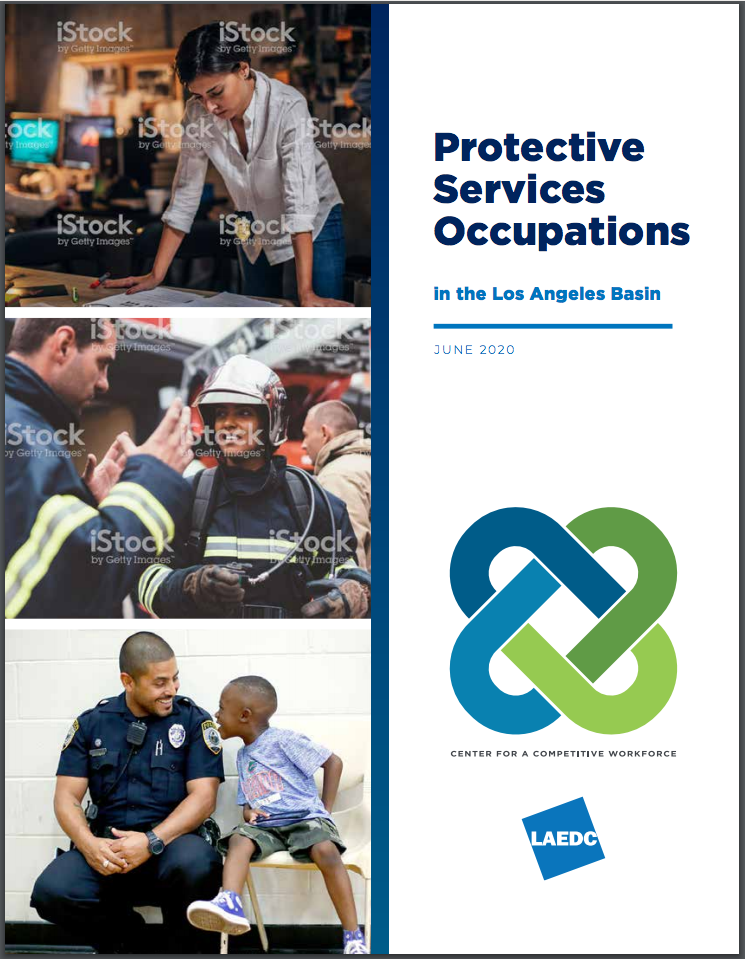CCW Protective Services Report
Protective Services Occupations in the Los Angeles Basin
Protective Services Occupations in the Los Angeles Basin
IN THIS REPORT, CCW:
 The partnership between our region’s community colleges and industry has never been more important. LAEDC, as the region’s economic development leader, is a strategic partner facilitating regional industry engagement efforts and providing the labor market research expertise from which good planning and data-driven decisions can be made. Together, the colleges and LAEDC are leading this important regional initiative to sustain our economy and deliver opportunity for students and businesses.
The partnership between our region’s community colleges and industry has never been more important. LAEDC, as the region’s economic development leader, is a strategic partner facilitating regional industry engagement efforts and providing the labor market research expertise from which good planning and data-driven decisions can be made. Together, the colleges and LAEDC are leading this important regional initiative to sustain our economy and deliver opportunity for students and businesses.
CCW convenes employers/industry and community colleges to promote collaboration and share insights on talent, technology and trends to strengthen the alignment of education and training that meets the needs of the rapidly changing industries that will dominate our economic future. This supports regional workforce development and employer engagement efforts, on behalf of the 19 colleges in the L.A. region, to better understand industry trends and the demands for talent, especially in middle-skill occupations, to ensure students and jobseekers are competitive for the jobs and careers of today – and tomorrow. The center’s work addresses the talent gaps employers face and the supply of skilled talent to meet projected workforce demand. CCW was founded as a Strong Workforce Program regional project of the 19 community colleges in the Los Angeles region, the L.A./O.C. Center of Excellence for Labor Market Research (COE), and the LAEDC and its Institute of Applied Economics. CCW has several work streams:
• Labor Market Analysis • Industry Councils • Regional Program Advisory Meetings • Work-Based Learning Partnerships • Company Visits and Career Videos • Workforce and Education Partners Portal • Bioscience Industry Portal
This CCW report, Protective Services Occupations in the Los Angeles Basin, is the 13th in a series of labor market and occupational reports since 2017. The purpose of this report is to analyze the growth and opportunity occurring in our region’s protective services occupations, identify the jobs that have the brightest future for community college students in the region, and provide information about talent needs to inform faculty, students, job seekers and others in the workforce development system. With this report as a guidepost, CCW seeks to facilitate industry-college engagement and partnerships including work-based learning, talent pipeline development and exchange of ideas.
L.A.’s protective services occupations represent opportunity because these positions pay well, employ a sizable percentage of middle-skill workers, and the demand created by job openings is forecast to be substantial.
141,000 workers were employed in protective services occupations in the LA Basin; of these, 37 percent are middle-skill occupations, which are attainable for workers with an associate degree or postsecondary nondegree award or certification. No protective services occupations are classified as above middle-skill. It is projected that there will be 9,650 annual openings in the six target occupations profiled in this report, but government budget changes will affect these projections.
Over the next five years, the LA Basin can expect 48,250 job openings across the six identified target middle-skill occupations in protective services. These middle-skill job openings provide both identifiable opportunities for workers to earn a living wage and well-defined “career ladders” to move up the economic opportunity chain.
141,060 workers were employed in protective services occupations in the LA Basin.
Over the next five years, the LA Basin can expect 48,250 job openings across the six identified target middle-skill occupations in protective services.
Of all the protective services openings over the five-year period, 37 percent will be in middle-skill occupations requiring some college education such as an associate degree or a nondegree award or certificate; this reinforces the selection of this industry as a valid target for community college programs.
In the six target occupations profiled in this report, there will be, on average, 9,650 job openings annually over the next five years.
CCW has identified six target protective services occupations in the Los Angeles region with good wages and significant job openings, for community colleges to train students:

What they do:
Control and extinguish fires or respond to emergency situations where life, property, or the environment is at risk. Duties may include fire prevention, emergency medical service, hazardous material response, search and rescue, and disaster management.
Wage: $39/hr.

What they do:
Guard inmates in penal or rehabilitative institution in accordance with established regulations and procedures. May guard prisoners in transit between jail, courtroom, prison, or other point. Include deputy sheriffs and police who spend the majority of their time guarding prisoners in correctional institutions.
Wage: $31/hr.

What they do:
Conduct investigations related to suspected violations of Federal, State, or local laws to prevent or solve crimes.
Wage: $58/hr.

What they do:
Maintain order, enforce laws and ordinances, and protect life and property in an assigned patrol district.
Perform combination of following duties: patrol a specific area on foot or in a vehicle; direct traffic; issue traffic summonses; investigate accidents; apprehend and arrest suspects, or serve legal processes of courts.
Wage: $50/hr.

What they do:
Collect, identify, classify, and analyze physical evidence related to criminal investigations. Perform tests on weapons or substances, such as fiber, hair, and tissue to determine significance to investigation. May testify as expert witnesses on evidence or crime laboratory techniques. May serve as specialists in area of expertise, such as ballistics, fingerprinting, handwriting, or biochemistry.
Wage: $45/hr.

What they do:
Conduct screening of passengers, baggage, or cargo to ensure compliance with Transportation Security Administration (TSA) regulations. May operate basic security equipment such as x-ray machines and hand wands at screening checkpoints.
Wage: $18/hr.
• When workforce demand is considered, there is some urgency for the creation and expansion of programs targeting protective services occupations. The aging workforce means that younger workers completing community college are in a key position to get a head start in learning the new technologies that that are now being used.
• The demographic composition also shows that females are vastly underrepresented, so strategies to involve women in firefighting, law enforcement and forensic positions (etc) from a young age may be helpful in building a stronger pipeline of qualified entrants.
• There are several ways in which the protective services industry can adapt to address looming challenges like the workforce gap and automation trends. A primary solution is to invest in programs that connect young workers with technological positions, as college completions have trended towards the knowledge- and analysis-based side of these target occupations.
• For the various enforcement positions, building positive community relationships has never been more important, hence greater emphasis on soft skills like cultural competency, negotiation, de-escalation, conflict resolution and stress management will help ensure that workers are properly equipped to handle the complex and dangerous situations they may face every day. Colleges and academies must prepare future officers for the interpersonal relationships and cultural competencies they must build with the residents they are tasked to protect. Spanish language skills and human relations, such as cultural sensitivity, are strongly emphasized.
• Attention should be placed on programs that emphasize advancements in technology and equip workers with the tools to perform in conjunction with it, such as with analyzing surveillance data.
• To support investigative and forensic career paths, creating labs, building programs emphasizing data analysis, and introducing students to AI are additional ways to help students adapt to industry trends.
• All the occupations benefit from scenario-based training that replicates real-life complexities which provide recruits the opportunity to enhance their instincts and problem-solving skills. This and other program elements can help new recruits to be better emotionally and technically prepared to meet complicated present-day policing challenges, especially with the deployment of BWCs that put officer actions in the public eye.
• It is more important than ever that protective services workers to act professionally on the job and maintain clarity of mind in stressful situations. Training programs must adapt to provide them the necessary tools to deal with the current cultural, social, and political climate that surrounds their jobs.
After clicking the links near the top of this page to read the full report or the highlights version, please explore this website. CCW works with the community colleges and industry partners, to help establish work-based learning partnerships and pathways, to enable conversations about scale and content of college programs to meet the hiring demand in industry. In addition the CCW partner portal serves as regional infrastructure to efficiently connect students and employers, so they can share job leads, work-based learning opportunities and resumes, on a Salesforce community platform.
CCW brings LA’s Industry, Talent, and Community Colleges together to be more demand‐driven, industry responsive, future‐forward and adaptive.
Start by asking a question and we are happy to point out high value ways you can use CCW to your advantage:
Reach out to: Isabel.Duran@laedc.org or claire.anderson@laedc.org